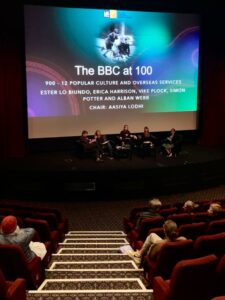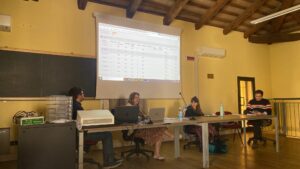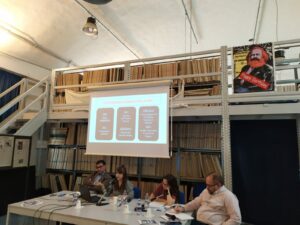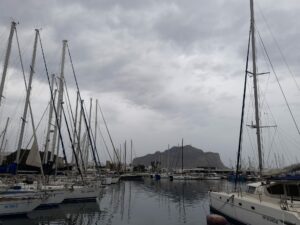Hello Euro Radio Wavers,
It’s been a long time!
I’ll start with a confession or, rather, a question: what kind of academic blogger do I want to be? So far I have been telling you about archive visits and conferences. I was actually planning to write in more detail about my research but then I realized that I personally see this blog as a space that should give you something different from what you can already read in my academic publications (but do get in in touch if you want to know more about them!)
I guess I am also inspired by the several times I was asked whether I am a student or when is my next tour (like I was a sort of travel blogger or rock star!). So consider this blog a space where you can hear about research as well as knowing more about the “behind the scene” for early career historians.
A lot has happened since my first post of the year: further visits to the Mediateca RAI in Bologna to find more programmes about British popular culture, guest lectures to university history students (special thanks to Fabio Guidali of the University of Milan and Federico Mazzini e Matteo Marinello of DISSGEA in Padua for inviting me!) and a seminar to our students and colleagues of the Anglo – americanistica seminar series at DISLL (thanks Anna Scacchi for the opportunity!)
Talking to colleagues, students or anyone who has the patience to listen to us about our research is one of the best aspects of an academic job among others. It is actually what makes sense out of the many hours we spend in libraries and archives reading and collecting material. If in the Seventeenth century John Donne said that “no man is an island” referring to human beings in general, this could not be truer for contemporary academics who are no longer isolated in their ivory towers.
After this very long premise (I’ve probably lost many of you already!), here I am with today’s topic, two conferences I attended this May. One about audio-visual archives we hosted at the DISGGEA Department on 9 May and entitled RAI Teche. Archiving and researching audiovisual digital sources, where I talked about my current research in Padua https://www.dissgea.unipd.it/conferenza-rai-teche-archiving-and-researching-audiovisual-digital-sources; and another one about Sicily and the global war in 1943, where I had the chance to talk about my previous project (17 – 18 May, https://www.unipa.it/dipartimenti/dems/Convegno-1943.-La-Sicilia-e-la-guerra-globale-/).
The last few years have marked some important anniversaries in radio history. The BBC’s centenary in 2022: the 70th anniversary of the birth of RAI (Radiotelevisione Italiana) this year; the 80th anniversary of the Allied occupation of Europe (2023 – 2025). While the last one is not strictly related to radio, it is undeniable that the Second World War was a turning point in radio history as geo – political relations during the conflict led to the creation of several radio stations broadcasting both nationally and abroad.

A shot from the BBC at 100 conference, Bradford, National Media Museum, 13 – 15 September 2022, panel on popular culture at the overseas services. From right to left: Alban Webb, Vike Ploke, Erika Harrisson, Ester Lo Biundo, Simon Potter, (online), Aasyia Lodhi (chair)
But let’s go back to this year! On 3 January 1954 announcer Fulvia Colombo officially launched the first RAI TV programme. In fairness, this anniversary only applies to television since Italian radio was officially founded in 1924, when EIAR (Ente Italiano per le Audizioni Radiofoniche) started its programmes. And yet EIAR, like any other institution founded by Mussolini’s government makes us reflect on the difficult legacy of a country that has experienced a fascist regime. Shall we start counting from the very first year of Italian radio, when there was no freedom of expression and Italians were only legally allowed to listen to, to read or watch fascist – produced contents? Or shall we rather decide that the birth of our national TV and radio dates back to a post – war and democratic Italian Republic? One way to go would be – and this is my chosen option – considering 1954 as a starting point but never stop remembering and explaining the danger of experimenting with a new communication technology in a non – democratic State.
The RAI Teche event was a great opportunity for our university students – and anyone who wanted to attend – to get an insight into the kind of audio – visual sources you can consult at RAI, listening to the point of views of both our brilliant RAI archivists (Francesca Cadin and Matteo Chiocchi) who introduced us to the digital RAI collections and an academic researcher (that would be me!) talking about the challenges of writing a cultural history of BBC and RAI when working with radio collections.

From left to right: Federico Mazzini (chair), Francesca Cadin (RAI archivist), Ester Lo Biundo (Post – doc researcher), Matteo Chiocchi (RAI archivist)
Lastly… Palermo! The city where it actually all started as my interest in radio dates back to 2012, when I was awarded my MA in History there. The conference, co – organized by the Istituto Gramsci Siciliano and the University of Palermo (thanks to the organizers Tommaso Baris, Manoela Patti and Giuseppe Giordano!) aimed at analysing Sicily and the Second World War in a Mediterranean and global context and included a special round table where academics, professionals working in cultural institutions and early career researchers, gave an insight into how to make accessible to the general public the Second World War and its legacy.

What could be possibly be the perfect conclusion of a weekend of interesting debates and chats with fellow academics in Palermo? A walk by the sea! Oh well, the minute the conference was over it started raining of course! (the luck of an academic on a research trip!). At least this time no one attacked the British Library’s website! (see my first post from 7 November).
Bye for now! Stay tuned and watch this space for updates from my colleagues!

Rainy Palermo